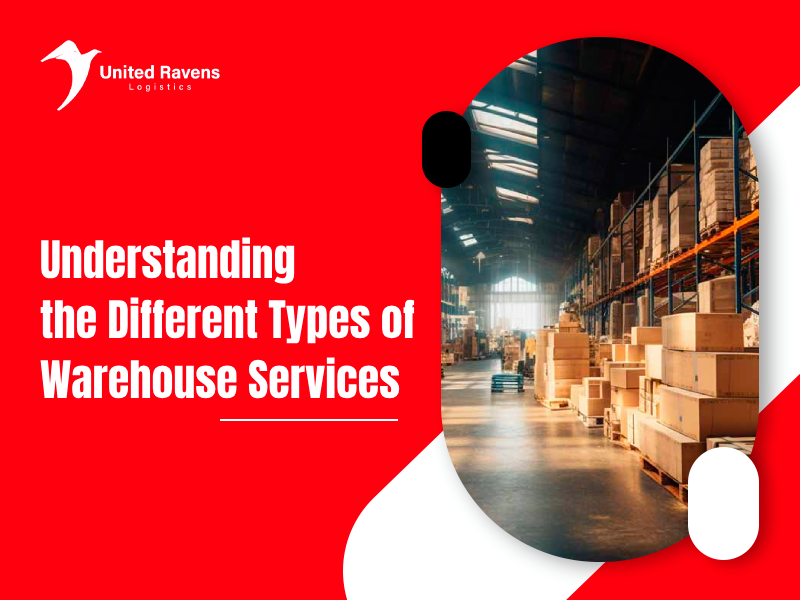A warehouse plays an essential role in keeping your goods and other materials safe. It acts as the storage hub for efficient logistics and supply chain management. From improving order processing to increased stock visibility, a warehouse is an indispensable part of supply chain management. But are you aware that there are different types of warehouse services that you can choose for your logistics operations? Let us explore these in the blog ahead.
What Are Warehousing Services?
The warehousing services generally are the services that offer complete management of goods in a warehouse. These services include activities such as picking, packing, organizing, managing the storage, and efficient distribution of goods. Now you must be thinking about who offers these warehousing services. Well, a logistics service provider offers these services along with other activities that complete the overall supply chain management.
10 Most Common Types of Warehouse Services to Choose From
Each type of warehouse service would serve different purposes, and choosing among them depends on your business needs. Nowadays, there are modern warehouses that many warehouse logistics service providers offer. These range from distribution centers to private warehouses and from cold storage to on-demand warehouses. Let us understand the 10 most common types of warehouse services that you can choose from.
Distribution Centers
If you are looking to store your goods in the long term, then distribution centers can be a viable choice. Distribution centers are also ideal for large quantities of goods and are affordable. These are often called DC warehouses, where the goods can be received, stored, and distributed quickly. Moreover, these warehouses are ideal for handling the movement of goods to be supplied daily.
Bonded Warehouse
A bonded warehouse is a type of warehouse wherein you can store your imported goods without any immediate payment of taxes. These warehouses are typically in a foreign country, allowing for exemption from taxes or customs duties. It gives your business various advantages, like accessing goods at any time, easy international shipping, and long-term storage options.
Public Warehouse
As the name suggests, a public warehouse is accessible to the public and serves as a cost-efficient option for new businesses. Now, some companies do not need warehouse services all year. This is because their business is seasonal. A public warehouse is an ideal option for companies that require seasonal services.
HAZMAT Warehouses
HAZMAT’ means hazardous materials such as toxic chemicals, waste products, and chemicals. A HAZMAT warehouse specializes in storing hazardous materials while maintaining safety measures. These warehouses follow all compliance measures and regulations to allow safe storage and specialize in storing dangerous materials while maintaining safety measures. These warehouses follow all compliance measures and regulations to allow the secure storage of hazardous materials.
Private Warehouse
Just like the government owns the public warehouses, the private warehouses are owned by a company division. You can opt for a private warehouse if you want to own a warehouse fully and have the funds to invest to secure it. Owning a private warehouse allows you complete control but can also be expensive.
Cooperative Warehouse
A cooperative warehouse becomes a great option if multiple businesses share similar inventory types and wish to save money by working together. A cooperative warehouse is generally for businesses that can come together to store their goods in a mutual space.
Consolidated Warehouse
Now, there might be several businesses that have smaller shipments. A consolidated warehouse works well for businesses with smaller shipments by combining them into one. All the smaller shipments are collected from different suppliers and consolidated or grouped into one in a consolidated warehouse.
Smart Warehouse
A smart warehouse is an emerging type of warehouse wherein robots, drones, and technology handle the processes. From packing and transporting to storing, all the operations are automated. Such more innovative moves in a warehouse minimize human errors and help save on labor costs.
Cold Storage Warehouse
A cold storage warehouse specializes in serving temperature-sensitive goods such as poultry, dairy products, and frozen foods. These types of warehouses are ideal for businesses that store temperature-sensitive goods. The cold storage warehouses offer benefits like insulated infrastructure, temperature control, and increased shelf life.
On-Demand Warehouse
An on-demand warehouse allows businesses to rent warehouse space whenever they require it. This option is ideal for businesses with seasonal or fluctuating demands. It saves costs as you only need to pay for the space you rented, i.e., on a pay-as-you-go basis.
Let’s Wrap Up
In this blog, we dived you through the 10 types of warehouse services. Each has different benefits depending on your specific business needs. However, if you’re looking for 3PL services to help you carry out your logistics operations, you must also have a fair understanding of the qualities to look for in a warehouse. These are that the warehouse has proper security, uses the latest technology, and maintains temperature controls and compliance.

